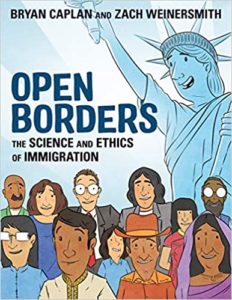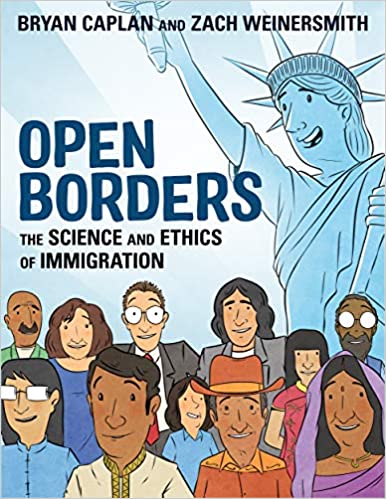
On Tuesday, October 26, I posted on what I saw as a particularly weak argument that Sam Enright used against open borders. He argued that open borders would substantially raise incomes of immigrants from poor to rich countries [true] and that this would increase the demand for products of factor farming [almost certainly true.] I pointed out that if we accept this argument for restricting immigration, then, if reducing Americans’ real income substantially reduced the demand for factory farming, then it would be hard to argue on his basis against drastically reducing Americans’ real income.
Sam Enright has replied.
He clearly understands my argument. But he seems to think that he has taken care of it with his reply. Here’s his whole reply:
Enough people were confused by this that I really should have made it clearer. I’m not saying that open borders are a bad idea because of animal suffering. I’m saying that, if we think that eating meat is wrong at all, then open borders is less good of an idea than it otherwise would be. The response to this has been a reductio: “Doesn’t this imply that it’s actually good to kill people or make them poor?”. But this only shows that the amount that animal suffering impacts these arguments is somewhere between “not at all” and “humanity is terrible and you should feel bad”.
I don’t get it. In his original review, Sam seemed to be saying that open borders are a bad idea because of animal suffering. Otherwise, why raise the issue? But now he says that he’s not saying that. Good. So what is he saying? He’s saying that “open borders is less good of [sic] an idea than it otherwise would be.” So then wouldn’t he have to say that, for the same reason, economic growth for Americans is less good an idea than it otherwise would be? And if that’s so, how much reduction in economic growth does he advocate?
He sums by saying what my argument “only shows” but again I don’t get it. I don’t see that it shows only the range of issues that he claims.
We’re back to the basic issue: Is the purported increase in factory farming due to higher incomes, which are due to more immigration, a good argument for limiting immigration? And if not, why raise the argument?
What say you, Sam?


READER COMMENTS
Thomas Lee Hutcheson
Oct 29 2021 at 4:59pm
Caplan seems t be treating this as a “yes/no.” Is X an argument for open borders?
Lots of X’s are arguments in the function that calculates how open borders should be and how they should be opened. That an argument appears in the function does not imply that at expected values of the variable it will have an appreciable effect on the outcome.
Robert Rounthwaite
Oct 29 2021 at 7:43pm
I think you could state your point more clearly: a whole lot of good things have the outcome of raising wealth and thus potentially raising the amount of factory farming. It seems that you both are in agreement that more open borders would lead to greater economic growth. Your question is, are open borders in any way different from these other sources of economic growth?
By the way, I read his response as somewhat of a walking back of his original statement which was actually just an attempt to raise the visibility of an issue he cares about versus an genuine argument against immigration.
Michael Stack
Oct 29 2021 at 11:03pm
I think his argument is pretty simple – he’s saying the cruelty to animals makes open borders marginally less attractive than it would be otherwise.
Is it decisive? No, so it would not be a reason alone sufficient to reject open borders.
AMT
Oct 29 2021 at 11:26pm
Bryan, you are correct.
Here’s an analogy:
You tell someone, “You should switch jobs to this other company because the pay is double for the same work!”
He cautions them, “But the commute would be 30 minutes instead of 15!!!!”
You will immediately stop listening to that person because they clearly have absolutely no idea what the value of anything is if they give you such utterly meaningless “advice.” Next he’ll say, “maybe you should consider biking the 20 miles to work, because you’ll save money on gas!”
Similarly, the fact that he is making this complaint at all implies he thinks it is, or possibly is, a bad idea. Since it is so obviously a good idea, it’s a complete waste of time to bother bringing up any obviously irrelevant counter arguments (irrelevant because the question is still nowhere close).
And yes, of course the exact same reasoning applies to increasing incomes of all people anywhere in the globe through economic growth. So he is necessarily also cautioning us against any economic growth. Anyone who argues against higher standards of living isn’t worth listening to.
Philo
Oct 29 2021 at 11:38pm
It seems he is saying that (completely) Open Borders is not as good as it would seem if we ignored the effect on Factory Farming, but that it may still be best on the whole. The marginal immigrant, who was almost indifferent between immigrating and staying put, may still produce enough good by immigrating to outweigh the negative Factory Farm externality. It is as if the magnitude of a non-zero lower-animal good/bad is infinitesimal, compared with any non-zero amount of human good/bad.
Infovores
Oct 30 2021 at 7:14am
Thank you for your post David. I was also confused by Sam’s response.
Alexandre Padilla
Oct 30 2021 at 2:49pm
David,
As countries and people become richer, they eat more animal meat and, thus, we see more animal suffering? What’s the empirical evidence for this? If anything, there might be as Bryan Caplan has argued when it comes to the environmental impact of immigration a meat-eating animal-suffering Kuznets curve. As people become richer, they do eat more meat from factories where animals are suffering and, past a certain level, they move onto grass-fed meat, eat pasture-raised eggs, and even fake meat.
When people move to richer countries with better institutions, more capital, better technology, etc. they do see their income rise but so do the natives. Even if it’s true that immigrants capture most of the gains from immigration, we cannot ignore that natives do so. Therefore, with more immigrants, it is possible that we see an increase in meat eating from factory farming but at the same time, you could see a decrease in meat eating from factory farming as the natives switch to more “ethical” meat eating.
Am I missing something? Using Bastiat, it seems that Sam Enright is focusing on what is seen and is not considering which is unseen.
Mark Bahner
Oct 31 2021 at 12:04pm
Yes, the solution is to push the move to fake meat in the quickest possible manner. If we look at where research in fake meat is being conducted, my guess is that the overwhelming majority of it is being conducted in rich countries, and the overwhelming majority of companies producing such products are in rich countries:
Fake meat, fake milk, fake fish: it’s the real future
Joel Pollen
Nov 1 2021 at 1:38pm
I agree with other commenters that Sam Enright is saying that an increase in meat consumption is a moderating argument against radically open borders, but not necessarily decisive. While Bryan makes a non-utilitarian ethical case for open borders, he also makes the claim that, quantitively, it increases global welfare. In his massive utility calculation, if he missed a term (such as increased animal suffering), it seems fair for Sam to point it out.
However, I think Sam’s argument has a few major problems.
The first is what I think David Henderson and others are getting at, but maybe not articulating clearly to Sam. As stated above, it’s fine and good to point out unintended negative byproducts of an ostensibly good thing. However, it seems suspect when these negative effects are mediated by increased wealth. Economics, I think, traditionally treats increased global wealth as a self-evident good. It’s not necessary to demonstrate why, or whether, this is so. You could object that this is homo economicus at it’s worst, and I think that’s a valid objection. But it seems like cherry-picking to question this foundational assumption (that more wealth is good) when we’re proposing immigration reform, when in fact if we reject the idea that more wealth is good, all kinds of policies and ethical norms are called into question. So this point should be framed as a critique of economics in general. I think it’s a bit unfair to claim it as a weakness of Bryan’s argument in particular.
The second problem is related, and perhaps it’s just a justification of the standard economic treatment of wealth as an inherent good. The problem is that it’s short-sighted to treat increased meat consumption as an inevitable effect of increased wealth. In the 1970s, it would be totally reasonable to assume that increased wealth would lead to an increase in spending on fax machines, but just a few decades later that would be completely untrue. If, for some reason, you thought the existence of fax machines to be a moral evil, maybe this would moderate your interest in wealth creation, but that would be a mistake.
Likewise, maybe in the short run a bunch of people moving from poorer nations to developed ones will mean more meat consumption — or maybe not. But either way, it may not matter in the long run. I’m very confident that making people wealthy will still be a good thing in 50 years, but it’s totally possible that in 50 years the vegetarians and animal rights activists have won and nobody eats factory-farmed meat, completely severing the apparent wealth-animal suffering connection. In that case, in hindsight our skepticism about open borders would have been a mistake.
David Johnston
Nov 1 2021 at 6:40pm
I don’t know what Sam’s specific views on the issue are. However, the culture of the Effective Altruist community considers it very valuable to interrogate foundational and seemingly safe assumptions like “more wealth for everyone is good”. In addition, factory farming in particular is considered a very large moral harm. In the US and Australia, people eat around 30 chickens each per year (https://www.tasteinc.com/five-countries-consume-chicken/). Thus if you think chicken wellbeing is around 1/30th as important as human wellbeing, it seems that the contributions of the US and Australia to chicken welfare may be more important than their contributions to human welfare. This is in my view an implausibly high value to place on the lives of chickens, but by raising this point I mean to show what assumptions might lead one to answer Henderson’s question with “yes, wealth is bad”.
I doubt Sam means this as an argument against open borders specifically; in fact, I do think he means it as a reason to consider that wealth may be bad overall.
Henderson asks how much less economic growth Sam thinks there should be, but such a policy is only recommended if the harm done via factory farming increases faster than the benefits brought about by prosperity, at least past some level of wealth. It seems more likely that one might advocate either: growth isn’t as good as we thought, but still good regardless of the starting wealth or: actually growth is bad and we should shrink the economies of the largest meat consumers worldwide.
Comments are closed.